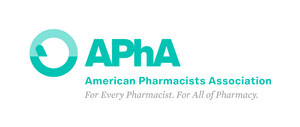
Though more actions are needed to address PBMs' harmful business practices
WASHINGTON, May 2, 2022 /PRNewswire/ -- CMS has issued a final rule eliminating Part D plans' and PBMs' use of retroactive direct and indirect remuneration (DIR) fees beginning on January 1, 2024 (contract year 2024). The American Pharmacists Association (APhA) and many of its members submitted comments to CMS on the proposal. APhA appreciates CMS' efforts to end the uncertainty and lack of drug cost transparency at the pharmacy caused by retroactive DIR fees.
Based on APhA's members' feedback, CMS' final rule also eliminated a proposed loophole that would have left it up to the Part D plans and PBMs to determine how much, if any, of the pharmacy price concessions they would pass through to patients at the point of sale during the coverage gap in the Medicare Part D program.
Retroactive DIR fees are price concessions not reflected at the point of sale for pharmacies participating in Medicare Part D networks. The retroactive fees are assessed weeks or even months after Part D beneficiaries' prescriptions are filled, resulting in pharmacies realizing only long after the prescription was filled that they did not recoup their costs. Between 2010 and 2020, CMS reported that retroactive DIR fees increased by a staggering 107,400%. These fees also result in patients paying more at the pharmacy counter for their prescription drugs.
The final rule merely moves the fees to the point-of-sale negotiated price. It does not eliminate these fees.
"We thank our members who stepped up and sent comments to CMS to ensure that their patients' voices were heard!" said Scott J. Knoer, MS, PharmD, FASHP, APhA executive vice president and CEO. "Eliminating the retroactive use of DIR fees is a step in the right direction, but it's only the tip of the iceberg to end PBMs' business practices that are harmful to patients and hurt our nation's pharmacies."
Knoer added "APhA will continue to work to eliminate these practices in the effort to help advance health equity in rural and underserved communities and keep pharmacy doors open in these communities, where the local pharmacy may be the only health care provider for miles."
"This decision benefits patients who often have to make difficult choices about paying for their medications," said Theresa Tolle, BSPharm, FAPhA, APhA president. "This often leads to poorer health outcomes and increased health care costs."
"Although it provides some predictability for pharmacies, more action is needed to address PBMs' anticompetitive practices that are impacting the viability of neighborhood pharmacies," Tolle continued.
APhA is the only organization advancing the entire pharmacy profession. Our expert staff and strong volunteer leadership, including many experienced pharmacists, allow us to deliver vital leadership to help pharmacists, pharmaceutical scientists, student pharmacists, and pharmacy technicians find success and satisfaction in their work and advocate for changes that benefit them, their patients, and their communities. For more information, please visit www.pharmacist.com.
- # -
SOURCE American Pharmacists Association




Share this article